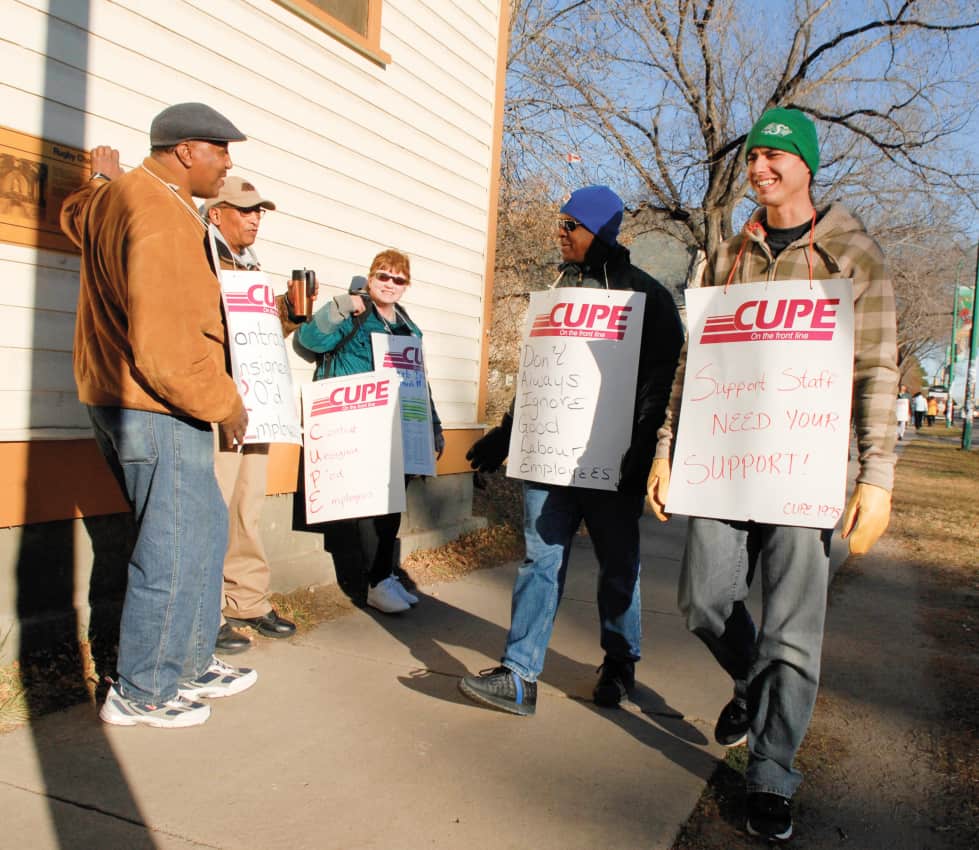
Talks between the Canadian Union of Public Employees Local 1975 and the University of Saskatchewan have continued to deteriorate as the two groups have been unable to come to a consensus on pension plans and wages, two of the issues at hand.
Both parties held talks in the presence of a mediator in January, and after several days of discussions, an agreement still was not reached. These meetings are the continuation of a long-running dispute between CUPE 1975 and the university that began in 2017 following the expiration of CUPE 1975’s collective agreement from 2015.
The disagreement about pension plans revolves around the U of S aiming to put a defined contribution or target plan into place, which would replace the current defined benefits plan, a plan that CUPE 1975 is fighting to keep. As for wages, the U of S has been bargaining for a three-year wage freeze while CUPE 1975 is attempting to garner two per cent wage increases for their members.
CUPE 1975 president Craig Hannah says that talks in December were going well, but when they came back to the table in January, they fell short.
“I firmly believe the decision was made not at that table but by Peter Stoicheff and the Board of Governors, and those are the ones that have to take a good look at what we’ve offered and realize it is a fair and it is a sustainable offer,” Hannah said.
The defined contribution plan, one of two plan options being offered by the university, gives retirees a lump sum of money. Ann Iwanchuk, CUPE 1975 national representative, explains her concerns with this type of plan.
“You have to start thinking about ‘How long am I going to live? How long am I gonna have this money for?…’ And it’s going to be a significantly less pot of money than you would have if you had a guaranteed retirement income for life,” Iwanchuk said.
Iwanchuk’s concern with the target plan, the other plan being offered by the university, is that it is unstable, meaning that retirees may have their benefits changed at any time.
Gord Hunchak, associate vice-president, strategic communications and chief communications officer of the university, explains the university’s problems with the current plan in a statement.
“The current defined benefit pension plan for employees who are members of CUPE 1975 has cost the university an additional $29.8 million beyond normal contributions over the past decade, $3.1 million in 2018, and these significant additional contributions are expected to continue into the future under the pension’s current structure,” Hunchak said. “These are funds that are being diverted from the university’s teaching and research mission.”
Hannah addresses these concerns and says that CUPE 1975 has taken financial sustainability into account throughout their “long effort to bargain reasonably and fairly with the university.” The plan that CUPE 1975 has put forward would see its members retain their current pension plan but modified to be jointly funded in order to address worries around sustainability.
Hunchak states that defined benefit pension plans have been “on the decline over the past number of years across the country due to the issues of financial sustainability and affordability.” However, Iwanchuk argues that, in the public sector, there are a number of university groups holding defined benefit plans.
Hunchak’s statement also explains the university’s offers for pension plans and wage increases.
“The university has tabled a very generous offer, which includes a revised pension arrangement, signing bonus in lieu of retro pay, two per cent wage increases in 2019 and 2020, additional vacation days and an updated salary model that aligns with market rates and allows for more growth,” Hunchak said.
The two per cent wage increases would come at the end of a five year deal meaning that, for three years, CUPE 1975 members would be receiving a wage freeze.
Iwanchuk says that other bargaining groups have received wage increases that they want for their members.
“So in 2016, 2017 and 2018, they provided wage increases for the other bargaining units on campus — so that would include the Administrative and Supervisory Personnel Association, the sessional lecturers [and] the faculty union. I haven’t worked with any employers who treat their employees differently in the way the university is treating CUPE 1975 members,” Iwanchuk said.
Iwanchuk further addresses these offers put forward by the U of S.
“Those offers are not generous; they’re insulting… When you look at zero increases, it’s worse than zero. It’s really a negative because the cost of living goes up, and you’re spendable income is decreased. Even though, technically, it’s staying the same, it’s going down, and you never recoup that,” Iwanchuk said.
Iwanchuk broadly describes the university’s offers as a “huge slap in the face to [1,900] people” before describing the necessity of the work being done by CUPE 1975 members.
“All the work that they do, the intake work and whatnot, is a necessary factor. The university wouldn’t function if [1,900] people walked off the job. The university wouldn’t be able to function, and that just may happen,” Iwanchuk said.
As it currently stands, neither the U of S nor CUPE 1975 are legally able to take job action due to outstanding applications to the Labour Relations Board. Iwanchuk says that CUPE 1975 will be dealing with these applications in February.
—
Jack Thompson / Sports & Health Editor
Photo: Davin Andrie File